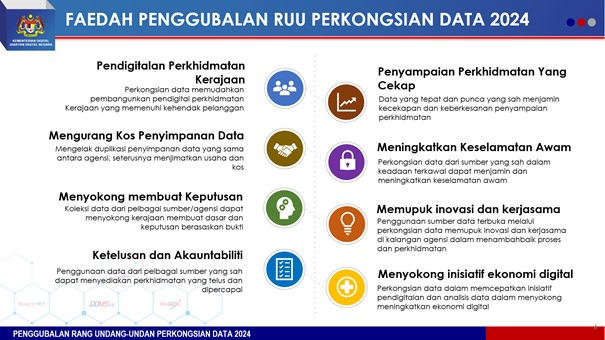Data Sharing Challenges
The main challenges associated with data sharing at this time are as follows:
(i) data privacy concerns;
(ii) current legal constraints;
(iii) data use security risks;
(iv) non-standard data formats and duplication of similar and repetitive data collection;
(v) data quality and accuracy; and
(vi) lack of trust in the data sharing ecosystem between stakeholders.
The drafting of the Data Sharing Bill 2024 is therefore a solution to overcome legal constraints in data sharing. In parallel, policies, circulars and guidelines will be formulated to provide detail guidance on the implementation of data sharing between public sector agencies under the Data Sharing Bill 2024. This initiative aims to ensure that data sharing within the public sector is carried out in a systematic and structured manner.
The Data Sharing Bill 2024 also gives due consideration to the need to protect certain types of data for national security reasons, public interest or other legitimate grounds that justify the data not being shared.
Data sharing under the Data Sharing Bill 2024 can be regarded as a disclosure permitted under other written laws as listed in the Schedule of the Bill and it will not involve any amendments to existing Federal legislation in force.
Currently, there are other acts and regulations that apply to public officers, namely the Official Secrets Act 1972 [ Act 88 ] and also the Public Officers Regulations (Conduct and Discipline) 1993 in the event that a public officer is convicted of a data breach while handling data. The application of the Data Sharing Bill 2024 for the purpose of data sharing within the control of public sector agencies should be read and managed in accordance with any legislation and directives relating to the security of official documents issued by the Government.
In other words, the Data Sharing Bill 2024 shall be in addition to, and not in derogation of, the provisions of other written laws that permit such a sharing of data.
Additionally, the Data Sharing Bill 2024 does not prevent any party from entering into data sharing agreements; however such agreements must be consistent with the purpose and provisions outlined under the Data Sharing Bill 2024.
The Data Sharing Bill 2024 serves as a clear legal mandate to regulate and enforce laws related to data sharing, enhance the effectiveness of digitalisation in public service delivery, and enable more efficient management and regulation of data sharing activities with the involvement of all relevant stakeholders.
The establishment of the National Data Sharing Committee and the regulatory role given to the Director General of the National Digital Department is an action towards creating a more systematic and focused public sector data sharing governance structure within the data sharing ecosystem at the Federal Government level.
The Data Sharing Bill 2024 will enable activities to manage and regulate data sharing to become more efficient with the involvement of all stakeholders.
This is intended so that data sharing can be implemented safely and effectively to realise the country’s aspiration in improving the digital economy.
In short, the Data Sharing Bill 2024 provides various benefits including the following:

Figure 8: Benefits of Enacting the Data Sharing Bill 2024
National Digital Department
Levels 1-6,
MKN Embassy Techzone Building
Block B, No. 3200
Jalan Teknokrat 2
63000 Cyberjaya, Sepang
Selangor Darul Ehsan
Tel: 603-8000 8000
Email: webmasterjdn@jdn.gov.my
Today’s Visitors: 107
Number of Visitors: 115876
Total Reach: 937770
This site is best viewed using the latest version of Microsoft Edge & Google Chrome web browsers with a minimum resolution of 1366×768.